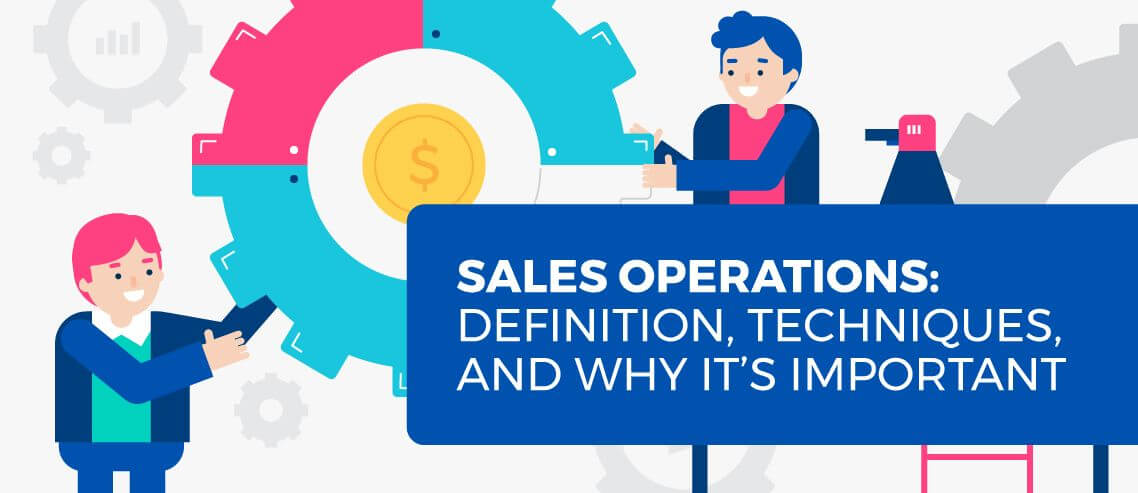Sales Operations: Definition, Techniques, and Why It’s Important

Contents
You might have the most talented salespeople in the world – reps who are exceptional at engaging prospects, asking the right questions, and closing the deal.
But if you don’t get the sales operations piece right, they simply won’t perform as well as they could, because they won’t have the systems and processes in place to complement their natural ability.
What Is Sales Operations?
In a nutshell, sales operations is all about allowing reps to spend more of their time selling, and less on things like admin, meetings, and low-value, labor-intensive tasks.
By building a more efficient sales unit, sales ops helps you achieve the results you need to move your business forward.
Often, this means implementing a system for selling that ensures that all reps are working towards the same goals, rather than all doing their own thing.
Why Is Sales Operations So Important?
Some salespeople see operations as a barrier to their selling efforts –they think that by putting structures and processes in place to define best practice and introduce a consistent approach, sales operations is restricting their natural flair.
However, sales operations is valuable because it removes friction from your sales process – the stuff that’s slowing your reps down and distracting them from the all-important business of speaking to prospects.
That means they’ll be more efficient and more productive, which in turns gives them more opportunity to close deals and drive revenue.
Sales Operations vs. Sales Enablement: What’s the Difference?
Sales operations and sales enablement are both about positioning you to sell more. But they’re not the same thing.
Broadly speaking, sales ops involves evaluating the best options for your sales team and making strategic decisions on those options. Sales enablement is then about implementing those decisions.
To give an example, on a strategic level, sales ops might establish that reps aren’t spending enough time on qualifying prospects, which is producing inefficiencies later on in the process. Sales enablement would then involve creating training sessions and materials to help reps qualify leads more effectively.
The two disciplines also tend to be involved in different parts of the sales process:
- Sales enablement: Typically involved higher up the funnel, focusing on prospect engagement and education.
- Sales operations: Typically involved further down the funnel, dealing more with negotiating and closing the sale.
What Responsibilities Does the Sales Operations Team Have?
The specific responsibilities of the sales operations function will vary slightly from one organization to another, but broadly speaking, they’ll touch on the following areas:
1. Data Management & Analysis
 You can’t build a more efficient sales process through guesswork – your decisions need to be driven by data.
You can’t build a more efficient sales process through guesswork – your decisions need to be driven by data.
That’s why sales ops needs to take the lead on managing and analyzing all relevant sales data, digging into the numbers to produce actionable recommendations.
The specific metrics and KPIs that they track will depend on the numbers that matter most to your business. If you only sell a single product for a fixed fee, average contract value just isn’t relevant, but it might be if you offer multiple tiers or bespoke pricing.
That said, here are a few things that your sales ops unit should consider tracking:
- Average calls made/emails sent per day: Simply put, are your reps speaking to enough prospects?
- Customer acquisition cost: The less you spend on winning a customer, the sooner that account becomes profitable.
- Close rate: If you’re only closing a small proportion of deals, it’s a sign you’re not qualifying prospects effectively.
- Lifetime value: Generate more value from each customer, and your revenue will grow without you having to win a ton of new accounts.
- Sales cycle length: If your sales ops team is doing its job, you should see a reduction in the average time from first contact with a prospect to closing the deal.
2. Sales Forecasting
Forecasting is often left to sales leaders, but it’s difficult.
Spend too long on it, and the figures will quickly become irrelevant. Put too little thought in upfront, and it’ll be pretty meaningless – you might as well have just picked some random numbers.
Because the ops team has access to a wealth of data, they’re often best placed to predict future revenue generation and activity levels. This allows sales leaders to identify potential issues before they arise and course correct to avoid them.
3. Cross-Team Collaboration & Stakeholder Management
Sales affects everyone within your organization.
The C-suite wants you to smash your sales targets. Team leaders want you to push their products. Everyone wants a pay raise, a promotion, a bigger budget, or to hire new team members. And none of that is possible if the sales team isn’t performing.
Understandably, a lot of stakeholders want to have their say on sales strategy, processes, and reporting.
That’s a lot of extra noise for your front-line salespeople to deal with.
Instead of involving your reps, leave the job of stakeholder management and communications to your ops team.
4. Sales Strategy & Communication
Because they have access to all that data, and because they’re taking a top-level view of sales processes and performance rather than getting bogged down in the deal, sales operations is in a fantastic position to develop effective new systems and strategies. Things that:
- Drive conversions
- Improve prospecting
- Speed up the sales cycle
Not only that, but they can also take the lead on communicating any changes in approach to sales leaders and other key stakeholders.
5. Training & Development
 No salesperson is the full package. Whether they’re an experienced, long-serving rep or a new starter, there’s always room for improvement – and that often comes through training.
No salesperson is the full package. Whether they’re an experienced, long-serving rep or a new starter, there’s always room for improvement – and that often comes through training.
The sales ops team will often take responsibility for creating and delivering training sessions and other collateral.
They might also build and implement a sales mentoring program to create support systems, share best practices, and improve morale.
In addition, sales ops will often take the lead on training reps to use new sales software. This approach makes a lot of sense, because it’s often the ops team who will first identify a need for new software to bring efficiencies to the sales process, and they’ll often choose the software as well.
6. Supporting Lead Generation
A lot of salespeople struggle with finding leads. It eats up a lot of their time and often doesn’t yield great results.
Sales ops can bring a ton of efficiency to this vital part of your sales operation.
For instance, they can build processes that increase alignment between your sales and marketing functions. That can help you answer questions like:
- How should sales be using buyer personas?
- Which rep should take the lead on handling marketing qualified leads?
- What sales enablement content do we need?
- Where should that content live?
7. Performance Management
Performance management is another vital part of sales that can be handled by your ops team in the form of:
- Developing compensation plans and incentives
- Creating processes for levelling-up poor performance
- Building systems for acknowledging top performers
They can also take the lead on regular performance reviews, or alternatively support sales leaders on how to carry out those reviews on their own.
8. Evaluating the Sales Process
How do you assess the effectiveness of a sales campaign, a new process, or a product launch?
By measuring and evaluating the data. This is a key responsibility of the sales operations function.
By digging into the numbers, the sales ops team is able to determine the success of your current sales strategies. If things aren’t working out as expected, they’re well placed to advise on a new approach or process.
Beyond this, sales ops will also use things like external benchmarks, competitor analysis, and internal performance data to build out new sales strategies where necessary.
Sales Operations Techniques & Best Practices
With such wide-ranging responsibilities, it can be difficult for sales ops teams to work out what to do next.
What will make the biggest impact? Revamping lead qualification or streamlining prospecting? Improving alignment with marketing or the C-suite? Building a new training program or coaching existing sales leaders?
Here are a few general techniques for running an effective sales ops function:
1. Collaborate With Sales Leaders on Strategy
Sales ops doesn’t exist in a vacuum. If the measures they put in place don’t have buy-in from the front-line sales team, they’re just not going to work.
What’s more, while sales ops is great at delivering data-driven insights, they lack hands-on experience of speaking to prospects and selling your product.
That’s why all strategic decisions should be made as a collaboration between ops and front-line sales leaders.
This approach reduces the risk of the ops function making conclusions based on data that just aren’t applicable or practical in the real world.
2. Set Up Analytics
 Throughout this article, I’ve discussed the importance of ensuring that sales ops has access to all the necessary data.
Throughout this article, I’ve discussed the importance of ensuring that sales ops has access to all the necessary data.
So as a starting point, the ops unit should lead the setup of all relevant sales analytics tools.
Which tools do they need? Well, that depends on the metrics they want to focus on, so they’ll also need to figure out the types of questions they want to answer down the line. Things like:
- How many calls or emails are our reps making per day?
- How big is our sales pipeline?
- How long, on average, does it take us to close a deal?
- How effectively are we qualifying prospects?
3. Define Clear Territories
Traditionally, sales was all about knocking on doors. That meant every salesperson had a defined geographic territory to ensure that no one stepped on each other’s toes.
Field sales is less common today, and even when it does still happen, it’s rare that the field sales agent will be going in cold – generally, the prospect will have spoken to someone else on the seller’s side first.
However, that doesn’t mean territories are no longer relevant. They just might not be geographic anymore.
Different salespeople are naturally better at speaking to different types of prospects or dealing with different types of organizations. Some might love the immediacy and accessibility of startups, while others might thrive on the more involved, relationship-driven world of enterprise sales.
Your ops team should be taking the lead on defining territories across your sales function and assigning leads accordingly.
4. Build a More Efficient Sales Process
No sales process is perfect.
If you have one in place already, there’s a good chance it falls apart from time to time.
And if you don’t have a formalized process in place, you definitely need one. Otherwise, you don’t even have a sales team – you just have a bunch of individuals doing whatever they feel like.
Whatever position you’re currently in, sales ops should have all the data they need to identify the inefficiencies and build something smarter. If they don’t already have the data, they should at least have the analytics tools in place to gather it.
You might want to give ops specific guidance on the specific parts of your sales process that may currently need improvement.
Alternatively, give them free rein to scour the whole process, seek out inefficiencies, and put measures in place to eradicate them.





